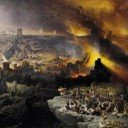As discussed previously the intention of this blog is to discuss the book of Revelation as it relates to the current popular eschatological views and the emphasis will will remain on the points that are prophetic in nature. With Chapters 2 and 3 we find the the seven “notes” to the seven Churches in Asia Minor.
For the purpose of our discussion we will will point the differing views on this section and then quickly move on to Chapter 4.
- Preterist and Idealist see them as letters to actual Churches of the time but with contemporary application. The seven letters are applicable to all churches at all times throughout the entire Church age. But they signify no more than the applicable lessons found within each letter
- Historicist see them as ages of time throughout the Church Age
- Futurist see them either as letters to actual Churches with little of no modern application. Or, mostly, they see them as ages of time throughout the Church Age.
- Most contemporary Futurist (Dispensationalist) believe we are in the Laodicean era. This is also true of the Historicist commentators throughout history. There is a natural compulsion for the commentators to want to be living in the final stages of human history and so they have a natural compulsion to find prophetic clues that will lead them to this conclusion. They have all, so far, been incorrect!
- One important note -regarding the Dispensational doctrine of imminence which is that Christ could come at any time from the first century to now. This theological construct is highly damaged if not completely destroyed by believing in the Church Letter Ages Theory. The Reason? Christ could NOT come at any moment if history had to travel through the seven Church ages. This was discussed in more detail in a previous post.
The last point of note in the seven letters section is the repeated use of the word come or coming. Christ speaks of His coming in many different ways and they all cannot and do not mean the second coming. This continues to show that it is dangerous to automatically associate the word with the Second Coming and Resurrection.
Rev 2:5 Remember therefore from where you have fallen; repent, and do the works you did at first. If not, I will come to you and remove your lampstand from its place, unless you repent.
Rev 2:16 Therefore repent. If not, I will come to you soon and war against them with the sword of my mouth.
Rev 2:25 Only hold fast what you have until I come.
Rev 3:3 Remember, then, what you received and heard. Keep it, and repent. If you will not wake up, I will come like a thief, and you will not know at what hour I will come against you.
Rev 3:20 Behold, I stand at the door and knock. If anyone hears my voice and opens the door, I will come in to him and eat with him, and he with me.
The commentator would be hard pressed to make any of the above passages relate to the Second Coming. Most are judgment comings in which the Church would be either rebuked or rescued. So, again, the words come or coming must be understood within it’s context and the reader must eliminate the natural desire to interpret it knee-jerk style as the Resurrection and Second Coming. Given the books theme of a judgment coming filled with retribution and recompense this would only make sense.





No comments:
Post a Comment